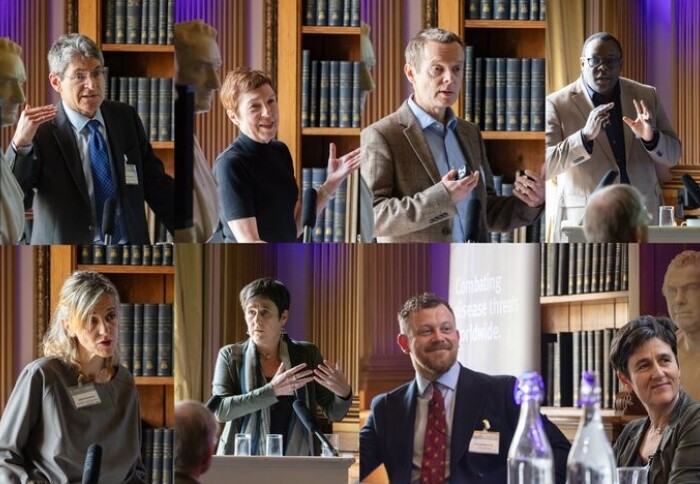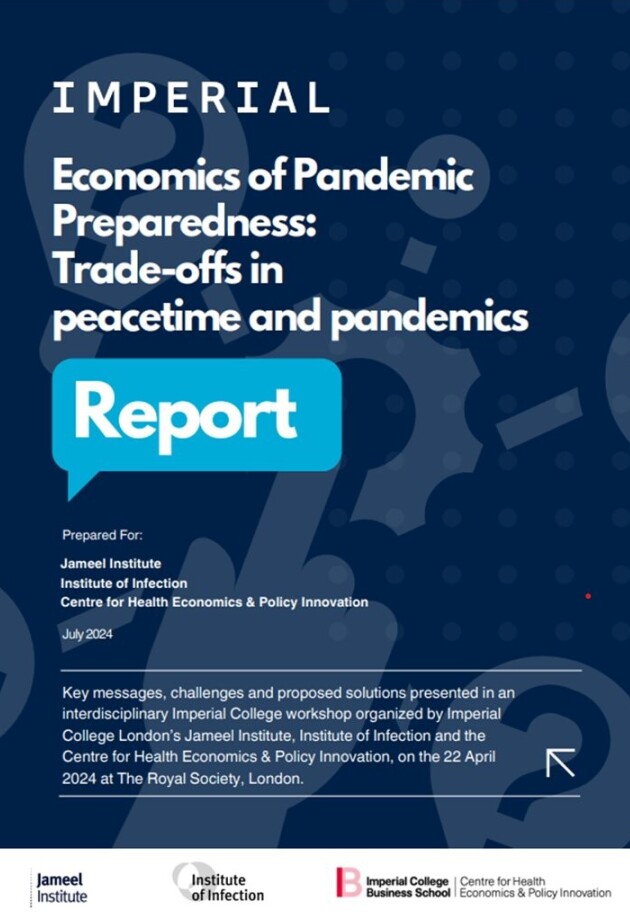Economics of Pandemic Preparedness: New report highlights key themes

A new report highlights addressing global inequalities and fostering transdisciplinary collaboration as being critical for pandemic preparedness.
In April, over 130 representatives from finance, economics, public health, epidemiology and infectious diseases assembled at the Royal Society and online for the workshop, Economics of Pandemic Preparedness: Trade-offs in peacetime and pandemics.
The themes and discussions from the event have now been summarised in a newly-published comprehensive event report.

The event was collaboratively organised by Imperial College London’s Jameel Institute, Institute of Infection and the Centre for Health Economics & Policy Innovation.
It provided a forum for experts to debate the policy, investment, and research priorities needed to effectively prevent, prepare for, and respond to pandemics in the context of limited budgets and the needs of both the global north and the global south. In particular, delegates discussed the tough choices that must be made to navigate the trade-offs between population health and the economy.
Professor Katharina Hauck, Deputy Director of the Jameel Institute and event co-organiser opened the meeting by affirming, “[we must] identify the best investments for pandemic prevention and preparedness, not only in terms of health gain, but also in terms of societal benefit and economic benefit, and not only for the countries of the global north but also for the global south.”
Expert speakers provide a range of perspectives
The six invited speakers included economists, mathematical modellers, behavioural scientists, representatives from the World Health Organisation, and advocates and policymakers from low-resource settings.
There is still inadequate investment by almost all governments in adequate measures to lessen the risk of epidemics and pandemics Professor Charles Bangham co-Director, Institute of Infection and event co-organiser
- Professor Jonathan Haskel (Imperial College Business School and External Member of the Monetary Policy Committee, Bank of England) spoke on the microeconomic and macroeconomic aspects of pandemic preparedness.
- Professor John Edmunds (London School Hygiene and Tropical Medicine) explained the need for integrated macro-economic and epidemiological models.
- Professor Susan Michie (Centre for Behaviour Change, University College London) emphasized the importance of applying behavioural science to pandemic management.
- Dr Ifedayo Adetifa (Clinical epidemiologist and former General Director, Nigeria CDC) provided a compelling overview of perspectives from a resource-constrained viewpoint.
- Professor Els Torreele (Institute for Innovation and Public Purpose, UCL) talked about the urgency for developing countermeasures for equitable access requires new economic thinking.
- Dr Edith Patouillard (WHO Department of Health Financing and Economics) focused on an integrated, holistic approach to modelling and policymaking built on multidisciplinary, cross-sector and interagency collaboration.
A full summary of the talks can be found in the event report.
The Challenge: Big picture thinking on key areas
In the afternoon, delegates assembled into groups in three focus areas:
- Vaccinations: public good and private incentives
- Infrastructure for surveillance, data and healthcare
- National and international governance and policy
In each group the delegates were challenged to answer three questions: If you had £5M, what would your research programme be? If you had £5B, what would you invest in for pandemic prevention, preparedness or response? Where should these funds come from?
Emerging themes
Throughout the day, discussions raised many fundamental questions: What are the outcomes we should aim for? How should we measure them? How can we reconcile the cost to public health with the cost to the economy? And lastly, what action is needed now, to make the most impact next time round?
Themes that emerged included:
- The critical need to address the substantial inequalities throughout the world in pandemic preparedness and response.
- Trade-offs between pandemic preparedness and the surveillance, prevention and management of endemic infectious diseases must be balanced.
- Preparations must extend beyond election cycles and even the lifetime of policymakers.
- The most effective way of preparing for a pandemic is to introduce measures to protect the population against the spread of infectious diseases, not only in epidemics and pandemics, but every day.
- Transdisciplinary collaboration is critical, facilitated by metrics that can be used to convey the value of pandemic preparedness activities to policymakers, economists, and the public.
- The importance of developing global networks to enable the sharing of intelligence by means of data, policy, research dissemination, professional training. This will build a multisectoral collaboration of experts who will provide better resilience and preparedness in the face of emerging epidemic threats.
Read the full report
The day would not have been possible without the expert contributions of the speakers, panellists and delegates who inspired discussion and debate. The organisers also thank Community Jameel and Kenneth C Griffin for their support of the Jameel Institute.
Links:
- Read the full report
- Watch the recording of the event
- Explore the work and focus areas of the organising partners.
Article text (excluding photos or graphics) © Imperial College London.
Photos and graphics subject to third party copyright used with permission or © Imperial College London.
Reporter
Melanie Bradnam
Department of Brain Sciences
Sara Williams
School of Public Health